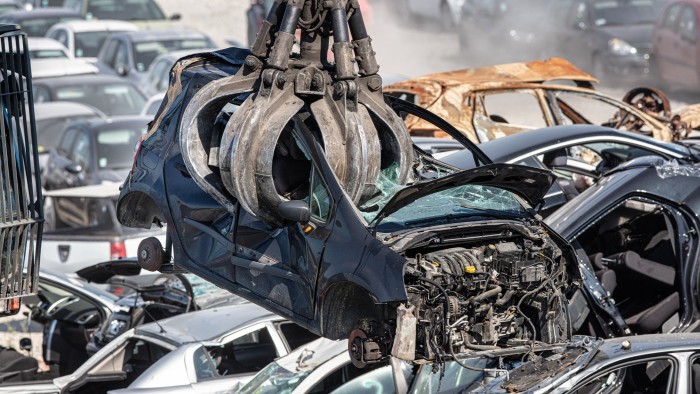Stay informed with free updates
Simply sign up to the Automobiles myFT Digest — delivered directly to your inbox.
European Commission and UK competition regulators on Tuesday fined trade bodies and carmakers including Volkswagen and Renault a total of more than €550mn after a joint investigation into a cartel involving vehicle recycling.
The EU’s antitrust watchdog levied fines totalling €458mn on 15 large car manufacturers as well as the ACEA, the European Automobiles Manufacturers’ Association, over the scheme. Other companies involved included BMW, Ford, Toyota, Honda, Hyundai, Jaguar Land Rover, Mazda, Mitsubishi, Suzuki, Opel and Volvo Cars.
The UK’s Competition and Markets Authority fined 10 car manufacturers and two trade bodies £77.7mn in relation to similar conduct. The CMA levied a fine on the UK’s SMMT trade body as well as the ACEA.
All the companies and trade organisations admitted taking part and settled with the European Commission and the CMA.
Mercedes-Benz, which also participated, avoided a fine in both investigations because it alerted European regulators to the cartel in 2019.
The regulators found that between 2002 and 2017, the carmakers co-ordinated their position by refusing to pay car dismantlers for recycling “end-of-life” vehicles — motor vehicles categorised as waste. They were also found to have co-ordinated their positions on how recyclable their vehicles were.
In the UK investigation, Ford received the highest fine, of £18.5mn, followed by Volkswagen’s £14.8mn penalty.
The highest fine levied by the European Commission was €128mn on Volkswagen.
The European Commission, in findings that were largely echoed in the CMA’s findings, said the manufacturers illegally agreed not to compete against each other when advertising what percentage of their cars could be recycled. The CMA said they agreed the conduct in a “gentleman’s agreement” called the “ELV Charta”.
The CMA and the Commission said the ACEA facilitated the agreements between the manufacturers in meetings and intervened when companies acted outside of the terms. The SMMT also attended the meetings and settled a handful of disputes between manufacturers.
EU competition chief Teresa Ribera said the commission would not tolerate “cartels of any kind”.
“That includes those that suppress customer awareness and demand for more environmental-friendly products,” she said.
Lucilia Falsarella Pereira, senior director of competition enforcement at the CMA, said it was illegal for companies to collude to restrict competition or agree with competitors the price they would pay for a service.
“This can extend to how you advertise your products,” she said.
Ribera, who was previously in charge of the green transition in the Spanish government, said high-quality recycling was key to meeting the EU’s circular economy objectives to improve recycling rates.
The UK and EU regulators co-ordinated their investigations.
Mercedes-Benz said it had co-operated “early and comprehensively” with both competition authorities.
“By co-operating transparently with the competent authorities, the company protects its shareholders and employees from significant financial and reputational risks,” it said.
The SMMT said it had co-operated fully with the CMA’s investigation and accepted its findings.
The ACEA also said it had co-operated fully with both investigations.
But it added: “While acknowledging the infringement, which should not have occurred, we note that it neither produced consumer harm nor reduced innovation.”
Additional reporting by Patricia Nilsson in Frankfurt and Kana Inagaki in London


